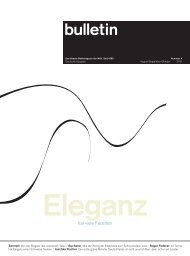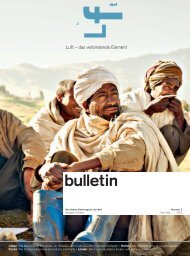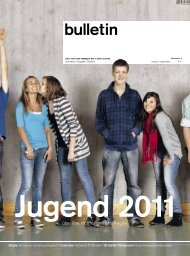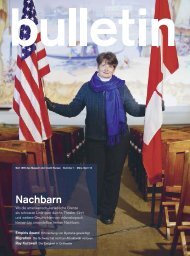Europe
From Crisis to opportunity Global Investor, 01/2014 Credit Suisse
From Crisis to opportunity
Global Investor, 01/2014
Credit Suisse
Create successful ePaper yourself
Turn your PDF publications into a flip-book with our unique Google optimized e-Paper software.
GLOBAL INVESTOR 1.14 — <br />
ADJUSTMENT REFORM AND RECOVERY<br />
<br />
As noted above, the competitiveness of the periphery countries had<br />
cy’s<br />
existence. Labor costs had shot up substantially, and productivity<br />
growth had not kept up with costs. As a result, unit labor costs<br />
among the EMU countries drifted apart: between 2000 and 2008,<br />
French, Italian and Spanish unit labor costs had risen relative to<br />
Germany’s by 20%, 30% and 35%, respectively. The consequence<br />
was that these economies were affected far more severely by the<br />
global downturn in 2008– 09<br />
within the Eurozone had not yet really erupted. When they did after<br />
2010<br />
was accentuated. Between the trough in the global economy in mid-<br />
2009 and mid-2013, the gap in overall production levels between,<br />
for example, Spain and Germany had widened by a stunning 35%<br />
. In the less cyclical (but far larger) services sectors,<br />
the divergence was less pronounced and therefore the divergence<br />
in per capita income between the north and south over the course of<br />
the crisis was not quite as dramatic. Yet, the massive gap in industrial<br />
production which opened over these years is one measure of<br />
the fact that the economic dominance of Germany within EMU has<br />
been enormously accentuated by the crisis. Even though most<br />
countries have seen more or less clear signs of economic recovery<br />
since mid-2013, this gap will take years to close, if at all.<br />
Industrial production<br />
<br />
120<br />
110<br />
100<br />
90<br />
80<br />
70<br />
Source: Datastream, Credit Suisse<br />
2005 2006 2007 2008 2009 2010 2011 2012 2013 2014<br />
Germany France Italy Spain Greece Portugal Netherlands<br />
Eurozone<br />
<br />
<br />
EMU countries<br />
<br />
<br />
<br />
crisis led to a disruption and fragmentation of<br />
<br />
<br />
<br />
<br />
Common standards and regulation, com mon<br />
<br />
<br />
would not lead to renewed fragmentation.<br />
Agreement in principle to push ahead with<br />
<br />
The ECB’s new building in Frankfurt is currently under construction.<br />
<br />
<br />
<br />
SSMECB<br />
<br />
SRM<br />
<br />
deposit insurance scheme that would pool<br />
<br />
runs do not occur. The SSM is to control and<br />
enforce adherence to rules, regulations and<br />
SRM is to ensure<br />
<br />
own feet are wound down in a timely way and<br />
<br />
said, the SRM<br />
<br />
<br />
<br />
<br />
EUR 50 billion at its disposal for the recapital<br />
<br />
<br />
<br />
ESM<br />
<br />
<br />
<br />
<br />
SRM. It was also<br />
<br />
<br />
<br />
moral hazard, it could lead to further delays<br />
<br />
<br />
<br />
<br />
<br />
for EMU<br />
<br />
accelerate the cleanup. In the long run,<br />
<br />
<br />
<br />
<br />
economic growth.

















